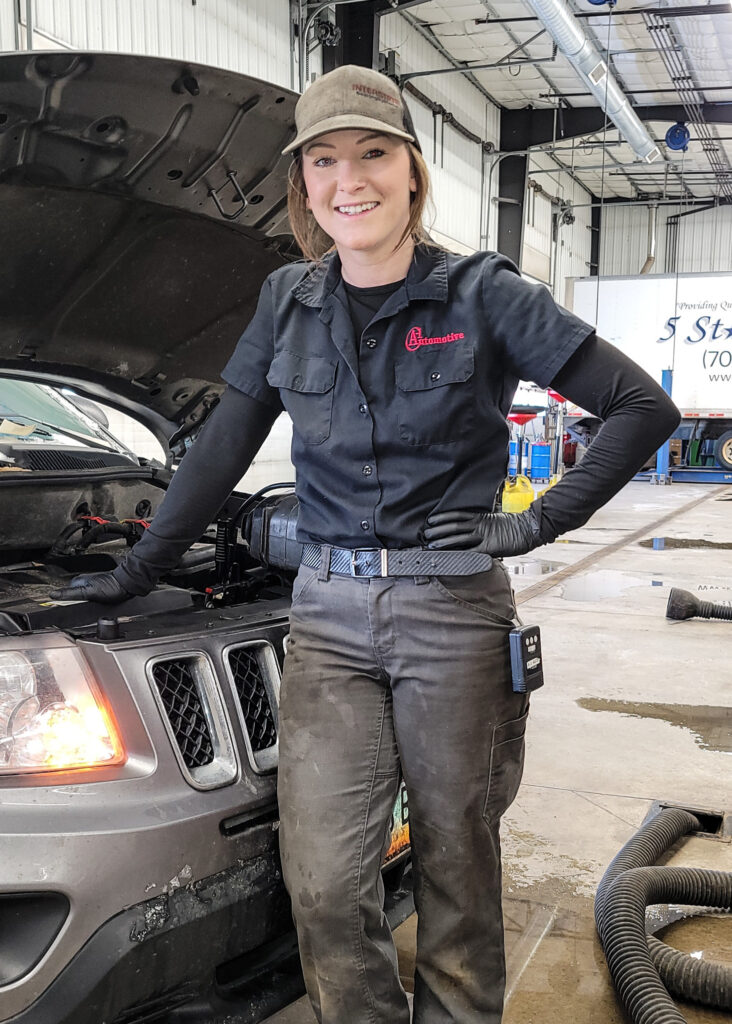
Josie Whitlock is one of only a couple women in the area working as automotive technicians. She is employed by A-1 Automotive & Transmission of Moorhead. (Photo/Nancy Hanson.)
Nancy Edmonds Hanson
Josie Whitlock is a rarity — the only female auto technician in Moorhead, one of perhaps only two in Fargo-Moorhead. It’s a career that she’s been training for since spending time at her father’s side, tinkering with their cars in the family garage in Roseau and, later, the Twin Cities.
She was the only female technician at Discount Tire in Eagan, Minnesota, where she worked part-time during high school. She was the only one in her class at technical school, the only one on her first two jobs as an automotive technician.
That’s still true today: As one of six technicians at A-1 Automotive Repair, she’s still the only woman working in the shop. And she doesn’t understand why.
“Really good job … really good money … really rewarding work,” the 25-year-old asserts. “And there are constant job opportunities everywhere. It’s insane.”
Granted, the number of women automotive technicians has doubled over the past 10 years, according to the U.S. Bureau of Labor Statistics. That brings it to a grand total of just 2.1% in the booming industry.
“I don’t understand,” she admits, shaking her head. “This is a great career. There was one other girl in my class at the State College of Science, but she dropped out in the first month. I’ve known a few others, but they’ve gone off in other directions.” Yet when she was looking for her present position, she posted her resume online — collecting six offers in the first eight hours. “Everybody,” she says, shaking her head, “needs mechanics.”
Josie developed a love for working in the shop early. At 16, she took a job at Discount Tires in Eagan, a Twin Cities suburb, where her family had moved from Roseau when she was in high school. “I changed and balanced tires along with the guys,” she remembers. “After awhile, the manager wanted to move me into sales and the administrative end. I found out I liked the shop a lot better, so I tried to get back there as fast as possible.”
After graduating from the technical college in Wahpeton, she found her first job at Wayne’s Automotive in Grand Rapids, Minnesota, where she was one of half a dozen technicians. Three years later, she moved to Fargo-Moorhead for more opportunities and to be closer to her fiance Luke Sammon, an engineer at CNH Industries in Fargo. She spent the next 18 months with Matt’s Automotive, then accepted her current job with A-1 Automotive one year ago.
Automotive work has always been a man’s world; a woman with the same skills, doing the same work, is a rarity. She is generally the first that her coworkers have met. While the situation seems ripe for bias, Josie says she’s faced very, very little in the shop: “For the most part, my coworkers and management have been very welcoming. They accept me as a colleague.”
Some customers, though, are problematic. “That’s where I see the most sexism,” she observes. “It bothered me at first, but I’ve learned to live with it. I do get it — old white dudes who can’t repair their cars themselves don’t like to think a young girl can do what they can’t. But that’s on them, not on me.”
She loves her work, tuning up or repairing three to five cars every day. A-1’s five male technicians, she says, are willing to take time out of their days when she needs a helping hand, just as they do for each other. “That’s been true everywhere I’ve worked,” she adds. “If any of us get stuck or need help lifting something, everybody steps in.”
While vehicles are her profession, Josie is the opposite of a “car nut.” She drives a 1993 Honda Accord on a daily basis, though there’s a Ford 350 parked at home to pull their camper. “You don’t want to make your job your hobby,” she admonishes. “Cars don’t really excite me. Most mechanics hate cars because we have to work on them all the time. I can appreciate a nice one, but I don’t want to spend my free time on it.”
Asked about the downside for a woman in what’s formerly a man’s world, Josie denies it’s a problem. “I don’t see any special challenge. Your gender doesn’t make the job any easier or harder,” she responds, but backtracks a bit: “If anything, it’s being small and not having that man-strength. But we have tools that even it up. It’s all about leverage. There’s no need anymore to have that brute strength.”
And there are advantages. She says, “Seventy percent of automotive customers are women. I think working with a woman helps some of them feel more comfortable and confident. I’m not going to talk down to them. You know, there’s a stigma in this field — a tendency to think all mechanics are sleazeballs. Educating the customer is the best way to overcome that.
“I treat every vehicle as if I was sending my grandma home in it.”


